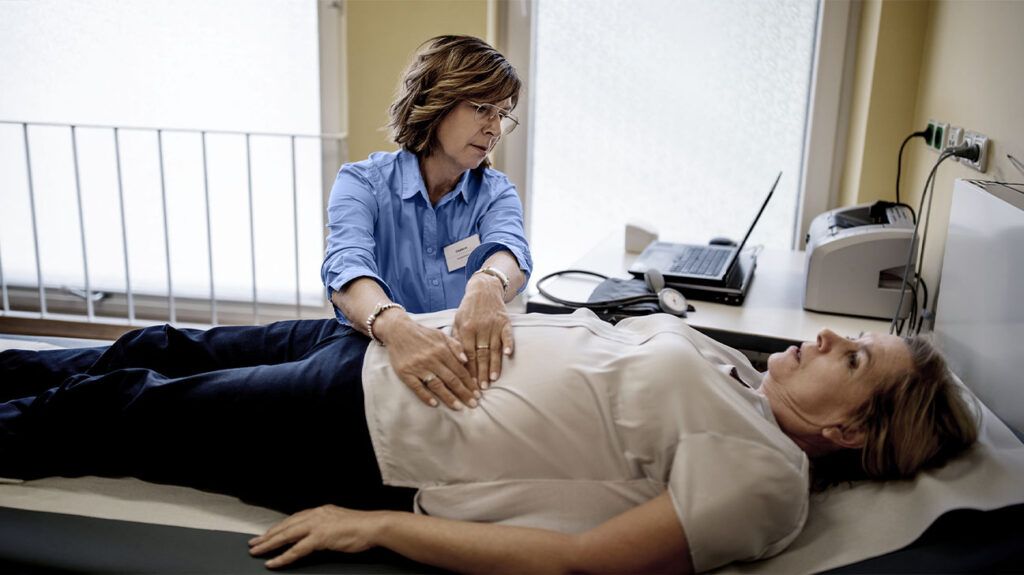Stomach cancer can grow for some time before causing noticeable symptoms. As the cancer grows or spreads to other parts of the body, it may cause symptoms such as bloody vomit or stool, unexplained weight loss, and more.
Stomach cancer grows from cells in the stomach. It develops slowly, and typically only causes symptoms in more advanced stages.
Read on to learn more about the potential symptoms of stomach cancer at early and advanced stages.
This article also looks at signs the cancer may have spread, ways to manage symptoms, and more.

Stomach cancer
This means that
Knowing about risk factors for stomach cancer may help with earlier detection.
Learn about the risk factors for stomach cancer.
Stomach cancer
If they do occur, symptoms of early stage stomach cancer may include:
- reduced appetite
- unexplained weight loss
- heartburn or indigestion
- abdominal pain or discomfort
- nausea
- feeling full quickly after eating only small amounts of food
- bloating
It is important to note that these symptoms can occur due to a wide range of conditions. It is rare that they indicate stomach cancer, but a person should still contact a doctor if they have concerns about the symptoms they are experiencing.
Learn more about the symptoms of stage 1 stomach cancer.
As stomach cancer advances, it is more likely to cause noticeable symptoms.
In addition to symptoms potentially present in earlier stages, a person
- bloody vomit (hematemesis)
- fatigue
- severe abdominal pain
- blood in stool
- abdominal fluid buildup (ascites)
Another potential sign is the development of an abdominal mass that healthcare professionals or a person can feel on examination. Lymph nodes may also present as swollen.
Infections and ulcers
A healthcare professional can help rule out different causes and diagnose stomach cancer if it is present.
Learn about stage 4 stomach cancer.
Stomach cancer that spreads, or metastasizes, may cause additional symptoms according to where the cancer spreads.
For example, if the cancer spreads to the liver, a person
In addition to the liver, stomach cancer
Stomach cancer that spreads to the bones
Directly treating the cancer may help to alleviate some symptoms of stomach cancer. A person’s doctor can advise on any medications that may be safe for them to take to manage pain and other symptoms.
The
Learn about treatment options for stomach cancer.
The following sections provide answers to some frequently asked questions.
Where is stomach cancer pain felt?
Many people may feel pain and pressure in their abdomen. If the cancer spreads, they may feel pain in their bones.
Does stomach cancer spread fast?
Stomach cancer is a generally slow-growing cancer. It can take a year or longer for cancer to become advanced or spread to other areas of the body.
Where is the first place stomach cancer spreads to?
Stomach cancer
Is stomach cancer fatal?
The outcome for stomach cancer is better with early diagnosis. Once it advances, it becomes more difficult to treat.
The
A relative survival rate helps give an idea of how long a person with a particular condition will live after receiving a diagnosis compared with those without the condition.
For example, if the 5-year relative survival rate is 70%, it means that a person with the condition is 70% as likely to live for 5 years as someone without the condition.
It is important to remember that these figures are estimates. A person can consult a healthcare professional about how their condition is going to affect them.
Stomach cancer typically does not cause symptoms in the early stages. If symptoms do develop early, they can include appetite loss, unexplained weight loss, heartburn, nausea, and abdominal pain.
As the cancer grows or spreads, it can lead to worsening or new symptoms. Examples include bloody vomit, blood in stool, severe abdominal pain, and fluid buildup in the abdomen.
If the cancer spreads, a person may experience symptoms associated with the location to which it spreads.
It is important to contact a doctor as soon as a person has concerns about stomach cancer. Treatment is generally more successful if doctors diagnose the condition in the early stages.
